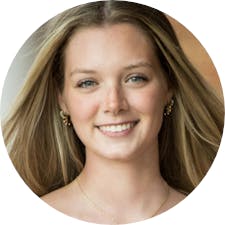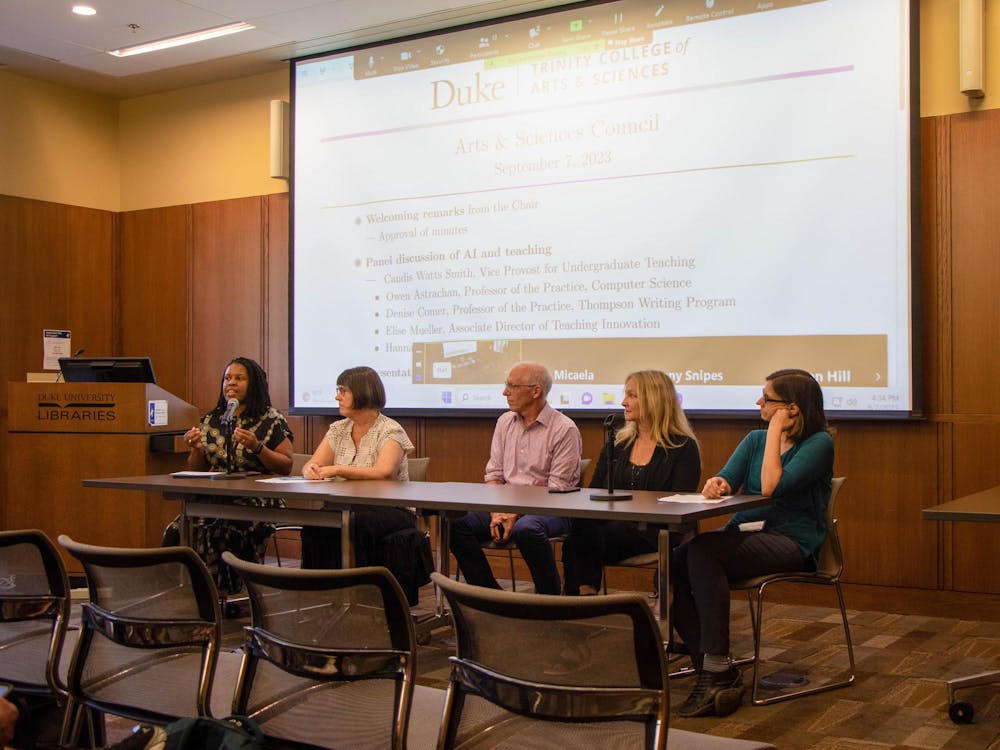Arts & Sciences Council reviewed its year-long plan to develop a new curriculum for undergraduate students in Trinity College of Arts & Sciences and discussed the role of generative artificial intelligence in the classroom during its first meeting of the year Thursday.
“This year will not be business as usual for the Council,” said Joshua Socolar, professor of physics and chair of the Council, in his opening remarks.
Though the Council will still perform its usual duties of approving new curricular programs and hearing relevant collegiate updates, Socolar said the Council’s year is “really going to be dominated by the process of developing a new curriculum for Trinity College undergraduate students.”
A new undergraduate curriculum
Roughly every 15 years, the Council is tasked with updating Trinity College’s curriculum. Its goal is to approve a new curriculum by spring 2024 and launch it in fall 2025 when the Class of 2029 arrives on campus.
Developing a new curriculum will involve “[revisiting] the entire bundle of classifications and requirements” necessary to graduate from Trinity College, Socolar said. As a result, current Areas of Knowledge and Modes of Inquiry requirements that Trinity undergraduates have to satisfy may be updated or completely replaced by a new system.
The Trinity Curriculum Development Committee was created in 2021 to begin a review of the curriculum. This year, it will continue its work under the leadership of Scott Huettel, professor of psychology and neuroscience, who serves as the committee’s chair.
The TCDC confirmed its goal to draft a proposal of the new curriculum to present to the Council in January 2024. Throughout this process, the Council will also provide feedback.
Once the TCDC presents its draft proposal in January, adjustments will be made based on Council feedback and a final proposal will be presented in March. The Council will then deliberate and vote on the final proposal.
“Our future students deserve an updated curriculum,” Socolar said. “We have to try our best to put one in place by the end of this academic year.”
AI in the classroom
As generative AI models like ChatGPT become readily available to students, the Council heard from a panel of faculty members about the challenges and opportunities of teaching and learning in an age of AI.
Owen Astrachan, professor of the practice of computer science, allows students to use AI models like ChatGPT on all non-assessment assignments in his Computer Science 201 course. However, he emphasized to the Council that students who use AI when writing code still need to understand the material themselves to succeed on assignments and in the computer science field.
“One of the reasons we have so many people majoring in computer science is because there's this pot of gold at the end of their time at Duke, which is a lucrative job that many of them seek,” Astrachan said. “They're not going to get that job if the way they solve problems is by giving them to ChatGPT.”
Denise Comer, professor of the practice of writing studies and director of the Thompson Writing Program, highlighted the wide variety of ways writing professors are treating AI in their classrooms. From banning it entirely to assigning projects that require students to use AI, Comer views the current accessibility of AI as “an opportunity to underscore for students what the value and purpose of writing is” and for faculty members to think critically about their assignments.
Elise Mueller, associate director of teaching innovation, echoed Comer’s opinions.
“The one thing that I care about today is that you engage yourself with generative AI and you talk to your students about it.” she said.
Hannah Rozear, librarian for biological sciences and global health, is interested in how students use AI to search for information, and hopes that students will “be curious and explore” when it comes to AI.
Both Rozear and Astrachan discussed AI and its role in the workplace after graduation.
Responses from the Council were mixed. Marcia Rego, director for faculty development and assessment for the Thompson Writing Program, asked if Duke faculty, as a “community of academics whose currency is [their] intellectual work,” are ready to accept ChatGPT as a legitimate citation.
Get The Chronicle straight to your inbox
Sign up for our weekly newsletter. Cancel at any time.
On the other hand, Carlos Rojas, professor of Asian and Middle Eastern studies, wondered whether AI models like ChatGPT will eventually be incorporated into the academic process as search engines like Google were in the past.
Astrachan raised the possibility of Duke buying the site license for GPT-4, ChatGPT’s most recent model, in order to grant equitable access to AI for all students. Mark Chaves, Anne Firor Scott distinguished professor of sociology, wondered if this may be a concrete step the Council could push for in the future.
In other business
The Council presented teaching awards to four faculty members.
The Richard K. Lublin Teaching Award was given to Bethzaida Fernandez, lecturer in the department of romance studies, for excellence in teaching in the arts and humanities. The Howard D. Johnson Award was given to Lecturing Fellow of Economics Genna Miller for excellence in teaching in the social sciences. The David and Janet Vaughan Brooks Award was given to Cynthia Rudin, Earl D. McLean, Jr. professor of computer science, electrical and computer engineering, statistical science, mathematics and biostatistics and bioinformatics, for excellence in teaching in the natural sciences. The Robert B. Cox Trinity College Distinguished Award was given to Jennifer Dodson, associate professor of the practice at the Thompson Writing Program, for overall excellence in undergraduate teaching.

Holly Keegan is a Trinity junior and a senior editor of The Chronicle's 120th volume.

